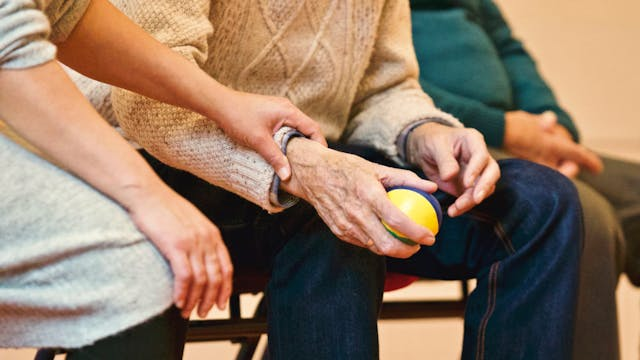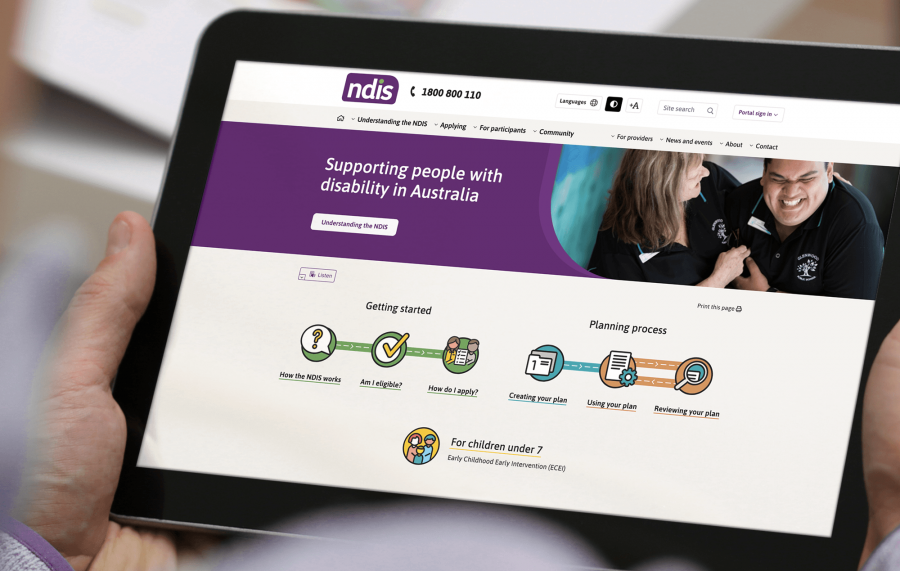Introduction

Navigating dementia support care can be a daunting journey, but with the right support services and practical strategies, it becomes one of compassion and resilience. At Re.Connect Support Services, we understand the unique needs of those living with dementia and their families.
In this comprehensive guide, we will explore a range of topics designed to provide valuable insights and helpful tips for managing dementia in a way that prioritises dignity, comfort, and quality of life.
We’ll also touch upon the various support systems available in Australia, such as the NDIS, Dementia Australia Website, and other local resources.
Understanding Dementia
What is Dementia?
Dementia is a progressive disease that affects the brain, leading to memory loss, behavioural changes, and a decline in cognitive abilities. There are several types of dementia, including Alzheimer’s disease, vascular dementia, and cognitive dementia.
Each type has its unique symptoms and progression patterns, but they all impact and affect the lives of those affected and their families.

Dementia is not a single disease but a term that encompasses various conditions characterised by cognitive decline. This includes difficulties with memory, language, problem-solving, and other cognitive skills that affect a person’s ability to perform everyday activities. Alzheimer’s disease is the most common form of dementia, accounting for 60-80% of cases. Other forms cognitive dementia include vascular dementia, Lewy body dementia, and frontotemporal dementia.
Causes and Risk Factors
The causes of dementia can vary, including genetic factors, lifestyle choices, and health conditions. Common risk factors include age, family history, cardiovascular health, and head injuries. Understanding these risk factors can help in early detection and management of the disease.
Genetic predisposition plays a significant role, especially in early-onset cases. Environmental factors such as smoking, excessive alcohol consumption, and poor diet also contribute to the risk. Cardiovascular issues like hypertension, diabetes, and stroke can further exacerbate the condition.
The Role of NDIS in Dementia Support
NDIS and Its Relevance to Dementia Care

The National Disability Insurance Scheme (NDIS) is a vital resource for Australians living with disabilities, including people with dementia too. The NDIS provides funding for various support services that can significantly improve the quality of life for people with dementia and their carers. These services include personal care, daily activities, respite services, and more.
The NDIS aims to provide personalised support to meet the specific needs of individuals. For those with dementia, this could mean funding for assistive technology, home modifications, or even specialist care providers. By offering tailored solutions, the NDIS helps people living with dementia maintain their independence and improve their overall well-being.
Eligibility and Access
To access NDIS support, individuals must meet certain criteria. This includes having a permanent and significant disability that affects their ability to participate in everyday activities. For those living with dementia, this often involves providing medical evidence and assessments. Re.Connect Support Services can assist families in navigating the application process to ensure they receive the support they need.
Eligibility for the NDIS requires a detailed assessment by healthcare professionals. This includes documentation from general practitioners, neurologists, or other specialists who can confirm the diagnosis and its impact on daily life. Once eligibility is confirmed, a personalised plan is developed in consultation with the individual and their family.
Practical Strategies for Dementia Care
Creating a Dementia-Friendly Environment

Creating a safe and supportive environment is crucial for those living with dementia. This includes making home modifications such as removing tripping hazards, installing grab bars, and using contrasting colours to highlight important areas. Maintaining a consistent routine and providing visual cues can help reduce confusion and anxiety.
Safety Modifications: Install grab bars in bathrooms, secure loose rugs, and ensure adequate lighting to prevent falls.
Routine and Structure: Establish a daily routine to provide a sense of stability and predictability. This helps in reducing anxiety and agitation.
Visual Cues: Use labels and signs to identify different types of rooms and objects. This can aid in navigation and reduce confusion.
Effective Communication Techniques
Communication is key when caring for someone with dementia. Use clear, simple language and maintain eye contact to help convey messages. Be patient and give the person time to respond. Non-verbal cues, such as facial expressions and gestures, can also play a significant role in communication.
Active Listening: Pay attention to verbal and non-verbal signals. Respond with empathy and understanding.
Simplify Language: Break down complex instructions into simple, manageable steps.
Non-Verbal Communication: Use gestures, facial expressions, and touch to convey messages when words fail.
Managing Daily Activities
Encouraging independence while providing necessary support is vital in managing daily activities. Break tasks into smaller steps, offer gentle prompts, and use adaptive equipment to assist with personal care and household chores. Engaging in familiar activities can boost confidence and reduce frustration.
Task Breakdown: Divide activities into small, manageable steps to make them less overwhelming.
Adaptive Equipment: Use tools like dressing aids, specialised utensils, and shower chairs to facilitate daily tasks.
Engagement: Involve the person in activities they enjoy, such as gardening, cooking, or arts and crafts. This promotes a sense of purpose and achievement.
Compassionate Care Approaches

Person-Centred Care
Person-centred care focuses on respecting and valuing the individual as a whole, considering their history, preferences, and needs. This approach ensures that care plans are tailored to the person, promoting dignity and enhancing their quality of life.
Individualised Plans: Develop care plans based on the person’s history, interests, and preferences.
Respect and Dignity: Treat the person with respect and maintain their dignity in all interactions.
Empathy and Compassion: Understand and support people and empathise with their feelings and experiences.
Emotional and Psychological Support
Providing emotional and psychological support is essential for both the the person living with dementia and their family. Understanding and addressing behavioural and psychological symptoms, such as agitation or aggression, through compassionate and patient interactions can significantly improve well-being. Support groups, community connection and counselling services offer additional help on memory service and resources.
Behavioural Management: Identify triggers for behavioural changes and other behaviour changes and develop strategies to manage them.
Emotional Support: Offer a listening ear and validate their feelings. Encourage participation in support groups where they can see younger people who share similar experiences.
Counselling Services: Professional counselling can help families cope with the emotional impact psychological symptoms of dementia.
Support for Families and Carers
The Role of Carers
Carers play a critical role in dementia care, often facing physical, emotional, and financial challenges. It’s important to provide carers with support, including respite services, training, and resources to help them manage their responsibilities.
Respite Services: Provide temporary relief for carers through respite with other carers, allowing them to rest and recharge.
Training and Education: Offer training programs to equip carers with the necessary skills and knowledge.
Support Networks: Encourage carers to join support groups to share experiences and gain emotional support.
Family Education and Involvement
Educating family members about dementia and involving them in the care process can enhance the quality of life for the person or person living with dementia themselves. Family education programs can provide valuable insights and practical strategies for managing daily challenges.
Education Programs: Conduct workshops and seminars to educate families about dementia and effective care strategies.
Involvement in Care: Encourage family members to participate in care activities and decision-making processes.
Information Resources: Provide access to informational resources like books, brochures, and online content.
Community Resources and Support Networks

Local Support Groups and Organisations
Connecting with local support groups and organisations can provide valuable resources and a sense of community for families affected by dementia. Organisations like Dementia Australia offer a wealth of information, support services, and educational programs.
Dementia Australia: As the national peak body, Dementia Australia provides comprehensive resources, including the National Dementia Helpline and educational programs.
Support Groups: Join local support groups to connect with others facing similar challenges and gain practical advice. A group Facilitator could be of a good assistance to this kind of approach.
Community Programs: Participate in community connection programs and activities designed for people with dementia and their carers.
Re.Connect Support Services
At Re.Connect, we offer a range of support services designed to support those living with dementia and their families. From practical assistance with daily activities to emotional support provide advice providing care and referral services, we are here to help.
Practical Support: Assistance with daily tasks, personal care, and home modifications.
Emotional Support: Counselling services and support groups for emotional well-being.
Support Coordination Services: Connect families with specialist services and resources.
Technological Aids in Dementia Care
Assistive Technologies
Assistive technologies can greatly enhance the quality of life for those with dementia. Devices such as medication reminders, GPS trackers, and smart home systems can provide safety and independence within the service system.
Medication Reminders: Use electronic pill dispensers to ensure timely medication administration.
GPS Trackers: Monitor the person’s location to prevent wandering and ensure their safety.
Smart Home Systems: Automate home functions like lighting, temperature, and security for added convenience and safety.
Telehealth and Remote Support
Telehealth services offer a convenient way for dementia patients to access medical advice and support without leaving their homes. These services can include virtual consultations with healthcare professionals and remote monitoring of health conditions.
Virtual Consultations: Schedule online appointments with general practitioners and specialists.
Remote Monitoring: Use wearable devices to monitor vital signs and alert caregivers of any issues.
Accessibility: Access healthcare services from the comfort of your own home, reducing the need for travel.
Holistic Approaches to Dementia Care
Integrating Physical Health and Wellbeing
Maintaining physical health is crucial for those with dementia. Encouraging regular exercise, a balanced diet, and proper hydration can help manage symptoms of memory loss and improve overall well-being.
Exercise Programs: Develop exercise routines tailored to the person’s abilities and interests.
Nutritional Support: Ensure a balanced diet rich in essential nutrients to support cognitive health.
Hydration: Promote adequate fluid intake to prevent dehydration and related complications.
Cognitive and Cognitive and Recreational Activities
Engaging in cognitive and recreational activities can help stimulate the brain and provide enjoyment and can further improve personal growth. Activities such as puzzles, reading, and social interactions are beneficial for cognitive health.
Cognitive Activities: Encourage activities like puzzles, memory games, and reading to stimulate brain function.
Recreational Activities: Engage in hobbies and social activities that the person enjoys, such as gardening, arts and crafts, or playing music.
Social Interaction: Promote socialisation through group activities, visits from friends and family, and community events.
Preparing for the Future
Planning for Progressive Care Needs
As dementia progresses, the care needs of the individual will change. Planning for future care requirements, huge changes such as transitioning to residential care or aged care services, can help ensure a smooth and supportive journey.
Future Care Planning: Discuss and plan for potential future needs, including in-home care and residential care options.
Residential Care: Explore aged care facilities and services that specialise in dementia care.
Aged Care Services: Familiarise yourself with the range of services available for older adults, including respite care and long-term care options.
Legal and Financial Considerations
It’s important to address legal and financial matters early in the dementia journey. This includes setting up important documents such as powers of attorney and managing finances to ensure the individual’s needs are met.
Legal Documents: Establish powers of attorney, wills, and advance care directives to ensure the person’s wishes are respected.
Financial Management: Plan for financial needs, including accessing government benefits and managing assets.
Professional Advice: Seek advice from legal and financial professionals who specialise in elder care and dementia.
Conclusion
The Importance of a Supportive Network
Navigating the journey of dementia requires a supportive network of other family carers, friends, and professionals. Utilising available resources and services can make a significant difference in the quality of life for those with dementia and their carers.
Support Networks: Build a network of support through family, friends, and community resources.
Professional Support: Access services more support provided by healthcare professionals, social workers, and counsellors.
Community Resources: Utilise local organisations and support groups to support people find practical and emotional support.
Re.Connect: Your Partner in Dementia Care
At Re.Connect Support Services, we are committed to providing compassionate and comprehensive support for individuals with dementia and their families which is also inclusive of mental health services in general. Whether you need practical assistance, emotional support, an education service or access to community resources, we are here to help.
Practical Assistance: From daily activities to home modifications, we offer hands-on help to make life easier.
Emotional Support: Our counselling services and support groups provide a safe space to share experiences and find comfort.
Resource Connections: We connect families with specialist services, educational programs, and other vital resources to ensure comprehensive care.
In this extensive guide, we’ve covered a range of topics to provide a thorough understanding of dementia support. By integrating our education service practical strategies and compassionate care, we can make a positive impact on the lives of those living with dementia and their carers. If you have any questions or need further assistance, please don’t hesitate to contact us.
Additional Resources and Support
Dementia Australia
Dementia Australia is the national peak body for people living with dementia, their families, and carers. Their website offers a wealth of information, resources, and support services. The National Dementia Helpline is available for advice and information.
Website: Dementia Australia
National Dementia Helpline: 1800 100 500
Local Community Organisations
Many local organisations provide support services, other supports, education programs, and community activities for people living with dementia and their carers. These organisations often offer practical support, respite services, and opportunities for social engagement.
Finding Local Support: Contact your local council or health service to find out about support groups and services in your area.
Online Resources and Education
There are numerous online resources and education programs available for those looking to learn more about dementia and how to manage it effectively. Websites like Dementia Australia offer educational materials, webinars, and training programs.
Online Courses: Many organisations offer online courses and training for carers and family members. These programs provide valuable knowledge and skills to help manage dementia care.
Government Support Services
In addition to the NDIS, there are other government support and other services also available to help people living with dementia and their families. These other services include short term case management, financial assistance, healthcare services, and aged care programs.
My Aged Care: The Australian Government’s My Aged Care website provides information on aged care services, including how to access respite care and residential aged care.
Centrelink: Centrelink offers financial support for carers, including the Carer Payment and Carer Allowance.
Personal Stories and Testimonials
Hearing from others who have walked the same path can be incredibly reassuring and inspiring. Here are a few personal stories from families who have benefited from Re.Connect Support Services:
Story 1: “Re.Connect has been a lifesaver for our family. The practical support and emotional carers that we’ve received have made such a difference in our lives. We couldn’t have navigated this journey without them.” – Sarah, family carer
Story 2: “The support groups and counselling services provided by Re.Connect have been invaluable. It’s comforting to know that we’re not alone and that help is always available.” – John, person living with someone with dementia with dementia
Story 3: “From home modifications to daily care, Re.Connect has been there every step of the way. Their team is compassionate, knowledgeable, and truly dedicated to making life easier for those with dementia.” – Emily, family member
Final Thoughts
Dementia care requires a holistic approach that includes practical strategies, emotional support, and community resources. By leveraging the services offered by Re.Connect and other support networks, families can ensure that their loved ones receive the best possible care. Remember, you are not alone on this journey. Reach out, seek help, and connect with others who understand what you’re going through.
Thank you for taking the time to read our comprehensive guide on dementia support service here. We hope you found it helpful and informative. If you have any further questions or need additional, support service here, please don’t hesitate to contact Re.Connect Support Services. We’re here to help you every step of the way.
Contact Re.Connect Support Services:
Phone: 1800 123 456
Email: info@reconnectservices.com.au
Website: Re.Connect Support Services
By providing practical assistance, emotional support, and connecting families with someone living with dementia and people living with dementia with the right resources, Re.Connect is dedicated to enhancing the quality of life for people living with dementia and their carers. Let us be your partner in this journey.


